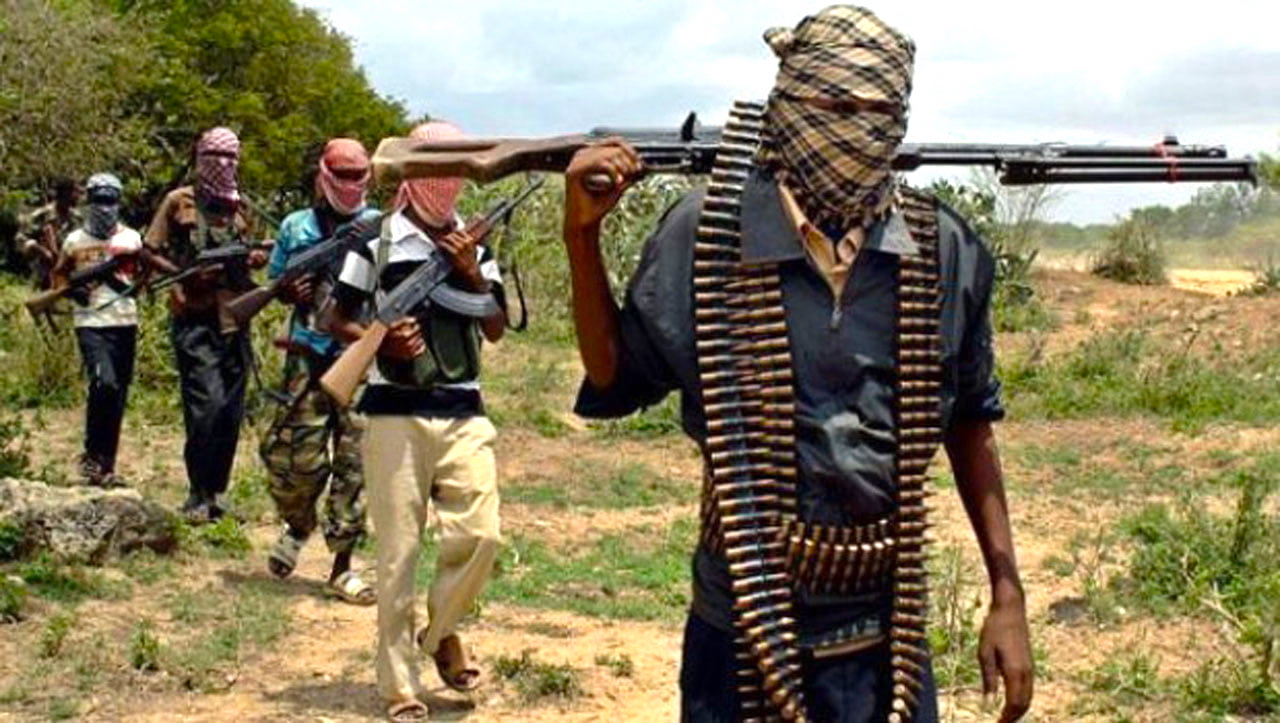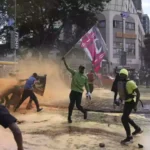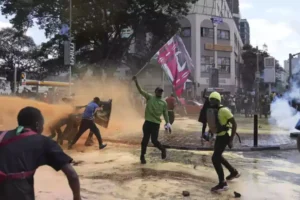Last Wednesday, when President Bola Tinubu constituted his cabinet, he appointed the immediate past governor of Zamfara State, Bello Matawalle, the Minister of State for Defence.
Mr Matawalle’s appointment has, however, raised a few eyebrows. During Mr Matawalle’s four-year tenure in Zamfara, the state was undoubtedly the most insecure in the country. During the period, terror gangs, locally called bandits, held sway across the state attacking communities, killing thousands of people, and abducting many more others in perhaps the largest kidnapping-for-ransom franchise in the history of the country.
Though banditry, as the activities of these outlaws are described by the Nigerian media and by politicians, was rampant across the county’s North-west region, their activities in Zamfara State during the governorship of Mr Matawalle, who was the chief security officer of the state, were unparalleled.
Though as governor Mr Matawalle has no direct control over security agencies fighting the terrorists, he took some decisions some of his critics said may have exacerbated the crisis, including possibly preventing security operatives from capturing the most ruthless terrorist that operated in the state.

In 2022, when Matawalle asked the people of the state to arm themselves and fight terrorists, several analysts challenged his decision, calling it unwise.
“Giving access to citizens to acquire weapons means you are opening a new chapter of violence – an eye for an eye. It is not a decision informed by knowledge or reality of what is on the ground. By saying everyone should [get] a weapon, you are indirectly saying you cannot provide security of lives and property. Then the question is, as a governor, what are you?” Murtala Ahmad – Rufa’i, the author of “I’m a Bandit” and an expert on banditry in the North-west, said in an interview.
‘Bello Matawalle as the minister of state for defence is a slap on our faces. This was someone who was governor of Zamfara State for four years but failed to make appreciable efforts to tackle the security situation due to his poor handling of issues,’ Sama’ila Balarabe, a senior lecturer at Hassan Usman Katsina Polytechnic, said.
Matawalle, banditry and Zamfara
Since 2011 terrorists have consistently carried out raids on mostly rural communities across Nigeria’s North-west region and parts of the North-central region.
These gangs rustle livestock, abduct local residents for ransom, carry out mass killings- sometimes of entire communities and force residents of farming communities to pay protection fees.
Zamfara State is in the North-west. It is one of Nigeria’s poorest states. According to the National Bureau of Statistics (NBS) National Multidimensional Poverty Index, 78 per cent of the residents of the state are poor.
The activities of the terrorists worsened after the 2019 general election. And they began to gain international notoriety after laying siege on the Abuja -Kaduna Expressway, one of the most important roads in the north of the country, abducting travellers and other road users at will.
In October 2019, the government set up a committee on armed banditry in the state; The committee was headed by a former inspector-general of police, Muhammed Abubakar. The committee reported that between 2011 to 2019, 6,000 people were killed in the State.
In 2021, media reports revealed that in Zamfara State alone, 703 people were killed, the highest in Nigeria. The number of those killed that year was a whopping 221 per cent increase from the previous year when only 219 people were killed.
In early 2020, Mr Matawalle decided to dialogue with terrorists. He explained that this would reduce attacks on communities. He later announced that he had granted amnesty from prosecution to bandits who handed over their arms o the government in exchange for cattle. But further details about the amnesty were not made public.
![FILE PHOTO: Bandits [Picture credit: Voice of America (VOA)]](https://media.premiumtimesng.com/wp-content/files/2021/07/Nigerian-Bandits.jpg)
Some of the most notorious terror gangs in the state such as those led by Bello Turji, Alhaji Nashamuwa, Auwalun Daudawa, and Ado Aleru.
The peace accord lasted a year because, in 2021, Mr Matawalle said he would no longer grant amnesty to terrorists. Though he didn’t give details of why the truce failed, the governor said the terrorists have returned to their old ways despite the peace accord between the state and them, which he said made things difficult for the government.
The terrorists said the state government didn’t fulfil its promises to them. Neither the terrorists nor the state government what the exact pledges were.
From January to December 2022, the state witnessed a surge in attacks partly blamed on the collapse of an amnesty deal with terrorists.
Controversial security policies
Naturally, as every chief security officer of a state would have done, Mr Matawalle tried to roll back the increasing attacks in the state. But some experts are of the view that some of his decisions were not only useless but may have also helped to empower some bandits, help them to evade arrest, and ultimately increase the frequency and intensity of the attacks.
Soon after he was sworn in as governor, Mr Matawalle initiated a peace accord with many of the terror gangs, including those led by some of the most ruthless terrorists in the state, such as Bello Turji, Alhaji Nahamuwa, Auwalun Daudawa, Ado Aleru. A year after the accord, Mr Matawalle said he would no longer negotiate with the terrorists, thereby signalling the end of the opaque truce.
For example, in Anka and Bukkuyum Local Governments, more than 200 people were killed in coordinated attacks in January. Thirty more people and several others were abducted; 50 people were also killed in Bakura, and 18 more in Maru. In 2022 the bandits started attacking traditional rulers and village heads. In that year alone, 23 traditional rulers were kille.
Though Mr Matawalle was not the first governor to grant amnesty to bandits (a former governor of Katsina State, Aminu Masari, did so on two occasions), the former Zamfara governor was accused of particularly acting cuddly with the terrorists.
In 2022, PREMIUM TIMES exclusively reported that the newly formed Yandoto emirate was planning to appoint a notorious banditry kingpin, Ado Alero, a self-confessed mass murderer, as the Sarkin Fulani. The story turned out to be true.

The coronation ceremony was witnessed by top government officials in the state, including the commissioner for security and home affairs, Mamman Tsafe; security advisor to the governor, Abubakar Dauran; Tsafe Local Government Chairman, Aminu Mudi; and representatives of the information commissioner, district heads and other traditional title holders and government officials. The state government gave its blessings for the ceremony, as reported by PREMIUM TIMES.
Following the public outcry that greeted the coronation, the government suspended the emir, Aliyu Marafa, but he was later reinstalled while the chieftaincy title given to Mr Alero was never withdrawn.
Another controversy that rocked Mr Matawalle’s administration was when he was reportedly gifted Toyota Hilux vans to “repented” terrorists in the state. Though his spokesperson, Zailani Bappa, said the story was false, local residents and government officials confirmed the story in different interviews.
An ex-local government chairman of Mr Matawalle’s home town, Maradun, Abubakar Maradun, said terrorists used some of the vehicles gifted to them to wage war on residents of the area.
Some top terrorists like Bello Turji and Ado Alero are still using Hilux vans during attacks on communities in the state. PREMIUM TIMES cannot independently verify whether the vans were those Mr Matawalle gave them.
In 2022, a traditional ruler in Kebbi State, which shares boundaries with Zamfara, Muhammadu Dudu, accused Mr Matawalle of shielding terrorists after they attacked communities in Kebbi.
“Governor Matawalle has refused to cooperate with the Kebbi State Government in tackling criminal bandits, terrorising the two States and other parts of the Northwest,” he told a PRNigeria investigation.
After claiming he has repented, The Matawalle administration housed a banditry kingpin, Auwalun Daudawa and his lieutenants, who masterminded the abduction of some pupils of Government Science Secondary School, Kankara, in the opulence of a state government’s chalet.
Mr Daudawa, his family and his fighters were later moved to a house bought by the state government, and all his needs were met. He later returned to banditry but lost his life to a rival group.
Aside from Mr Daudawa, another “repentant” terrorist, Bello Tagoje, was said to have been lodged at one of the houses at the Zamfara State Government House for two years. Mr Tagoje was said to have access to top security officials in the state during Mr Matawale’s administration.
A civil society group, Zamfara-based, Concerned Citizens for Peace, Security and Development, said Mr Matawalle’s handling of the amnesty deal emboldened the terrorists.
“Matawalle’s strategy had empowered and emboldened bandits to carry more heinous crimes against humanity in the way and manner he related with them through regular phone calls and monetary and vehicular gifts to bandits’ kingpins operating in Zamfara State.
“Until recently, it was alleged that one of the notorious bandits’ kingpins (Bello Tagoje) was allegedly housed in a 4-bedroom apartment at the Zamfara State Government House. The apartment is called Kebbi House, where he allegedly stayed for about two years,” the group alleged,” chairman of the group, Abdullahi Anka, said in a petition letter.
Mr Matawalle’s refusal to implement the recommendations of a fact-finding security committee he set in 2019, which was headed by a former Inspector General of Police Muhammad Abubakar, also left many wondering if he was actually committed to finding a lasting solution to the insecurity in the state.
In the committee report, five emirs, 33 district heads, and some security agents, including ten soldiers and civil servants, were indicted. The committee recommended that a judicial commission of inquiry be inaugurated, among other recommendations. The chairman of the committee didn’t mention the names of those indicted.
Despite his pledge to prosecute those indicted as well as implement the recommendations of the committee, Mr Matawalle didn’t do that in the next four years he was governor.
‘And that report I read is very comprehensive because they were very clear, they were very courageous, they didn’t shy away from naming people, they didn’t shy away from saying what was going on, right? They recommended prosecution, including for former politicians who were holding high offices in the land, but nothing has happened. So, there is a degree of courage that is required if we are to tackle this issue in a way that will make a huge difference,’ a Zamfara-born media entrepreneur, Kadaria Ahmed, said in a Twitter space last year.
Mr Matawalle was also cheery picked whom to punish or not for dealing with bandits. Though Mr Matawalle did not sack the indicted traditional rulers and other suspects as recommended by the report of the committee, two emirs and a district lost their thrones following allegations of aiding banditry. The traditional rulers were Atiku Abubakar of Zurmi, Hussaini Umar of Dansadau and Sulaiman Ibrahim of Birnin Tsaba. Government officials said the traditional rulers were suspended, and a committee was set up to investigate allegations against them, and they were found guilty.
Source : Premium Times
















